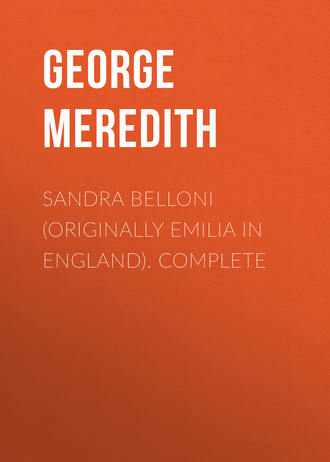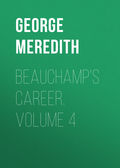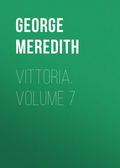
George Meredith
Sandra Belloni (originally Emilia in England). Complete
CHAPTER XLIII
[Georgiana Ford to Wilfrid:]
“I have omitted replying to your first letter, not because of the nature of its contents: nor do I write now in answer to your second because of the permission you give me to lay it before my brother. I cannot think that concealment is good, save for very base persons; and since you take the initiative in writing very openly, I will do so likewise.
“It is true that Emilia is with me. Her voice is lost, and she has fallen as low in spirit as one can fall and still give us hope of her recovery. But that hope I have, and I am confident that you will not destroy it. In the summer she goes with us to Italy. We have consulted one doctor, who did not prescribe medicine for her. In the morning she reads with my brother. She seems to forget whatever she reads: the occupation is everything necessary just now. Our sharp Monmouth air provokes her to walk briskly when she is out, and the exercise has once or twice given colour to her cheeks. Yesterday being a day of clear frost, we drove to a point from which we could mount the Buckstone, and here, my brother says, the view appeared to give her something of her lost animation. It was a look that I had never seen, and it soon went: but in the evening she asked me whether I prayed before sleeping, and when she retired to her bedroom, I remained there with her for a time.
“You will pardon me for refusing to let her know that you have written to your relative in the Austrian service to obtain a commission for you. But, on the other hand, I have thought it right to tell her incidentally that you will be married in the Summer of this year. I can only say that she listened quite calmly.
“I beg that you will not blame yourself so vehemently. By what you do, her friends may learn to know that you regret the strange effect produced by certain careless words, or conduct: but I cannot find that self-accusation is ever good at all. In answer to your question, I may add that she has repeated nothing of what she said when we were together in Devon.
“Our chief desire (for, as we love her, we may be directed by our instinct), in the attempt to restore her, is to make her understand that she is anything but worthless. She has recently followed my brother’s lead, and spoken of herself, but with a touch of scorn. This morning, while the clear frosty sky continues, we were to have started for an old castle lying toward Wales; and I think the idea of a castle must have struck her imagination, and forced some internal contrast on her mind. I am repeating my brother’s suggestion—she seemed more than usually impressed with an idea that she was of no value to anybody. She asked why she should go anywhere, and dropped into a chair, begging to be allowed to stay in a darkened room. My brother has some strange intuition of her state of mind. She has lost any power she may have had of grasping abstract ideas. In what I conceived to be play, he told her that many would buy her even now. She appeared to be speculating on this, and then wished to know how much those persons would consider her to be worth, and who they were. Nor did it raise a smile on her face to hear my brother mention Jews, and name an absolute sum of money; but, on the contrary, after evidently thinking over it, she rose up, and said that she was ready to go. I write fully to you, telling you these things, that you may see she is at any rate eager not to despair, and is learning, much as a child might learn it, that it need not be.
“Believe me, that I will in every way help to dispossess your mind of the remorse now weighing upon you, as far as it shall be within my power to do so.
“Mr. Runningbrook has been invited by my brother to come and be her companion. They have a strong affection for one another. He is a true poet, full of reverence for a true woman.”
[Wilfrid to Georgiana Ford:]
“I cannot thank you enough. When I think of her I am unmanned; and if I let my thoughts fall back upon myself, I am such as you saw me that night in Devon—helpless, and no very presentable figure. But you do not picture her to me. I cannot imagine whether her face has changed; and, pardon me, were I writing to you alone, I could have faith that the delicate insight and angelic nature of a woman would not condemn my desire to realize before my eyes the state she has fallen to. I see her now under a black shroud. Have her features changed? I cannot remember one—only at an interval her eyes. Does she look into the faces of people as she used? Or does she stare carelessly away? Softly between the eyes, is what I meant. I mean—but my reason for this particularity is very simple. I would state it to you, and to no other. I cannot have peace till she is restored; and my prayer is, that I may not haunt her to defeat your labour. Does her face appear to show that I am quite absent from her thoughts? Oh! you will understand me. You have seen me stand and betray no suffering when a shot at my forehead would have been mercy. To you I will dare to open my heart. I wish to be certain that I have not injured her—that is all. Perhaps I am more guilty than you think: more even than I can call to mind. If I may fudge by the punishment, my guilt is immeasurable. Tell me—if you will but tell me that the sacrifice of my life to her will restore her, it is hers. Write, and say this, and I will come: Do not delay or spare me. Her dumb voice is like a ghost in my ears. It cries to me that I have killed it. Be actuated by no charitable considerations in refraining to write. Could a miniature of her be sent? You will think the request strange; but I want to be sure she is not haggard—not the hospital face I fancy now, which accuses me of murder. Does she preserve the glorious freshness she used to wear? She had a look—or did you see her before the change? I only want to know that she is well.”
[Tracy Runningbrook to Wilfrid:]
“You had my promise that I would write and give your conscience a nightcap. I have a splendid one for you. Put it on without any hesitation. I find her quite comfortable. Powys reads Italian with her in the morning. His sister (who might be a woman if she liked, but has an insane preference for celestial neutrality) does the moral inculcation. The effect is comical. I should like you to see Cold Steel leading Tame Fire about, and imagining the taming to be her work! You deserve well of your generation. You just did enough to set this darling girl alight. Knights and squires numberless will thank you. The idea of your reproaching yourself is monstrous. Why, there’s no one thanks you more than she does. You stole her voice, which some may think a pity, but I don’t, seeing that I would rather have her in a salon than before the footlights. Imagine my glory in her!—she has become half cat! She moves softly, as if she loved everything she touched; making you throb to feel the little ball of her foot. Her eyes look steadily, like green jewels before the veil of an Egyptian temple. Positively, her eyes have grown green—or greenish! They were darkish hazel formerly, and talked more of milkmaids and chattering pastorals than a discerning master would have wished. Take credit for the change; and at least I don’t blame you for the tender hollows under the eyes, sloping outward, just hinted… Love’s mark on her, so that men’s hearts may faint to know that love is known to her, and burn to read her history. When she is about to speak, the upper lids droop a very little; or else the under lids quiver upward—I know not which. Take further credit for her manner. She has now a manner of her own. Some of her naturalness has gone, but she has skipped clean over the ‘young lady’ stage; from raw girl she has really got as much of the great manner as a woman can have who is not an ostensibly retired dowager, or a matron on a pedestal shuffling the naked virtues and the decorous vices together. She looks at you with an immense, marvellous gravity, before she replies to you—enveloping you in a velvet light. This, is fact, not fine stuff, my dear fellow. The light of her eyes does absolutely cling about you. Adieu! You are a great master, and know exactly when to make your bow and retire. A little more, and you would have spoilt her. Now she is perfect.”
[Wilfrid to Tracy Runningbrook:]
“I have just come across a review of your last book, and send it, thinking you may wish to see it. I have put a query to one of the passages, which I think misquoted: and there will be no necessity to call your attention to the critic’s English. You can afford to laugh at it, but I confess it puts your friends in a rage. Here are a set of fellows who arm themselves with whips and stand in the public thoroughfare to make any man of real genius run the gauntlet down their ranks till he comes out flayed at the other extremity! What constitutes their right to be there?—By the way, I met Sir Purcell Barrett (the fellow who was at Hillford), and he would like to write an article on you that should act as a sort of rejoinder. You won’t mind, of course—it’s bread to him, poor devil! I doubt whether I shall see you when you comeback, so write a jolly lot of letters. Colonel Pierson, of the Austrian army, my uncle (did you meet him at Brookfield?), advises me to sell out immediately. He is getting me an Imperial commission—cavalry. I shall give up the English service. And if they want my medal, they can have it, and I’ll begin again. I’m sick of everything except a cigar and a good volume of poems. Here’s to light one, and now for the other!
“‘Large eyes lit up by some imperial sin,’” etc.
(Ten lines from Tracy’s book are here copied neatly.)
[Tracy Runningbrook to Wilfrid:]
“Why the deuce do you write me such infernal trash about the opinions of a villanous dog who can’t even en a decent sentence? I’ve been damning you for a white-livered Austrian up and down the house. Let the fellow bark till he froths at the mouth, and scatters the virus of the beast among his filthy friends. I am mad-dog proof. The lines you quote were written in an awful hurry, coming up in the train from Richford one morning. You have hit upon my worst with commendable sagacity. If it will put money in Barren’s pocket, let him write. I should prefer to have nothing said. The chances are all in favour of his writing like a fool. If you’re going to be an Austrian, we may have a chance of shooting one another some day, so here’s my hand before you go and sell your soul; and anything I can do in the meantime—command me.”
[Georgiana Ford to Wilfrid:]
“I do not dare to charge you with a breach of your pledged word. Let me tell you simply that Emilia has become aware of your project to enter the Austrian service, and it has had the effect on her which I foresaw. She could bear to hear of your marriage, but this is too much for her, and it breaks my heart to see her. It is too cruel. She does not betray any emotion, but I can see that every principle she had gained is gone, and that her bosom holds the shadows of a real despair. I foresaw it, and sought to guard her against it. That you, whom she had once called (to me) her lover, should enlist himself as an enemy, of her country!—it comes to her as a fact striking her brain dumb while she questions it, and the poor body has nothing to do but to ache. Surely you could have no object in doing this? I will not suspect it. Mr. Runningbrook is acquainted with your plans, I believe; but he has no remembrance of having mentioned this one to Emilia. He distinctly assures me that he has not done so, and I trust him to speak truth. How can it have happened? But here is the evil done. I see no remedy. I am not skilled in sketching the portraits you desire of her, and yet, if you have ever wished her to know this miserable thing, it would be as well that you should see the different face that has come among us within twenty hours.”
[Wilfrid to Georgiana Ford:]
“I will confine my reply to a simple denial of having caused this fatal intelligence to reach her ears; for the truth of which, I pledge my honour as a gentleman. A second’s thought would have told me—indeed I at once acquiesced in your view—that she should not know it. How it has happened it is vain to attempt to guess. Can you suppose that I desired her to hate me? Yet this is what the knowledge of the step I am taking will make her do! If I could see—if I might see her for five minutes, I should be able to explain everything, and, I sincerely think (painful as it would be to me), give her something like peace. It is too late even to wish to justify myself; but her I can persuade that she—Do you not see that her mind is still unconvinced of my—I will call it baseness! Is this the self-accusing you despise? A little of it must be heard. If I may see her I will not fail to make her understand my position. She shall see that it is I who am worthless—not she! You know the circumstances under which I last beheld her—when I saw pang upon pang smiting her breast from my silence! But now I may speak. Do not be prepossessed against my proposal! It shall be only for five minutes—no more. Not that it is my desire to come. In truth, it could not be. I have felt that I alone can cure her—I who did the harm. Mark me: she will fret secretly—, but dear and kindest lady, do not smile too critically at the tone I adopt. I cannot tell how I am writing or what saying. Believe me that I am deeply and constantly sensible of your generosity. In case you hesitate, I beg you to consult Mr. Powys.”
[Georgiana Ford to Wilfrid:]
“I had no occasion to consult my brother to be certain that an interview between yourself and Emilia should not take place. There can be no object, even if the five minutes of the meeting gave her happiness, why the wound of the long parting should be again opened. She is wretched enough now, though her tenderness for us conceals it as far as possible. When some heavenly light shall have penetrated her, she will have a chance of peace. The evil is not of a nature to be driven out by your hands. If you are not going into the Austrian service, she shall know as much immediately. Otherwise, be as dead to her as you may, and your noblest feelings cannot be shown under any form but that.”
[Wilfrid to Tracy Runningbrook:]
“Some fellows whom I know want you to write a prologue to a play they are going to get up. It’s about Shakespeare—at least, the proceeds go to something of that sort. Do, like a good fellow, toss us off twenty lines. Why don’t you write? By the way, I hope there’s no truth in a report that has somehow reached me, that they have the news down in Monmouth of my deserting to the black-yellow squadrons? Of course, such a thing as that should have been kept from them. I hear, too, that your—I suppose I must call her now your—pupil is falling into bad health. Think me as cold and ‘British’ as you like; but the thought of this does really affect me painfully. Upon my honour, it does! ‘And now he yawns!’ you’re saying. You’re wrong. We Army men feel just as you poets do, and for a longer time, I think, though perhaps not so acutely. I send you the ‘Venus’ cameo which you admired. Pray accept it from an old friend. I mayn’t see you again.”
[Tracy Runningbrook to Wilfrid:] (enclosing lines)
“Here they are. It will require a man who knows something about metre to speak them. Had Shakespeare’s grandmother three Christian names? and did she anticipate feminine posterity in her rank of life by saying habitually, ‘Drat it?’ There is as yet no Society to pursue this investigation, but it should be started. Enormous thanks for the Venus. I wore it this morning at breakfast. Just as we were rising, I leaned forward to her, and she jumped up with her eyes under my chin. ‘Isn’t she a beauty?’ I said. ‘It was his,’ she answered, changing eyes of eagle for eyes of dove, and then put out the lights. I had half a mind to offer it, on the spot. May I? That is to say, if the impulse seizes me I take nobody’s advice, and fair Venus certainly is not under my chin at this moment. As to ill health, great mother Nature has given a house of iron to this soul of fire. The windows may blaze, or the windows may be extinguished, but the house stands firm. When you are lightning or earthquake, you may have something to reproach yourself for; as it is, be under no alarm. Do not put words in my mouth that I have not uttered. ‘And now he yawns,’ is what I shall say of you only when I am sure you have just heard a good thing. You really are the best fellow of your set that I have come across, and the only one pretending to brains. Your modesty in estimating your value as a leader of Pandours will be pleasing to them who like that modesty. Good-bye. This little Emilia is a marvel of flying moods. Yesterday she went about as if she said, ‘I’ve promised Apollo not to speak till to-morrow.’ To-day, she’s in a feverish gabble—or began the day with a burst of it; and now she’s soft and sensible. If you fancy a girl at her age being able to see, that it’s a woman’s duty to herself and the world to be artistic—to perfect the thing of beauty she is meant to be by nature!—and, seeing, too, that Love is an instrument like any other thing, and that we must play on it with considerate gentleness, and that tearing at it or dashing it to earth, making it howl and quiver, is madness, and not love!—I assure you she begins to see it! She does see it. She is going to wear a wreath of black briony (preserved and set by Miss Ford, a person cunning in these matters). She’s going to the ball at Penarvon Castle, and will look—supply your favourite slang word. A little more experience, and she will have malice. She wants nothing but that to make her consummate. Malice is the barb of beauty. She’s just at present a trifle blunt. She will knock over, but not transfix. I am anxious to watch the effect she produces at Penarvon. Poor little woman! I paid a compliment to her eyes. ‘I’ve got nothing else,’ said she. Dine as well as you can while you are in England. German cookery is an education for the sentiment of hogs. The play of sour and sweet, and crowning of the whole with fat, shows a people determined to go down in civilization, and try the business backwards. Adieu, curst Croat! On the Wallachian border mayst thou gather philosophy from meditation.”
CHAPTER XLIV
Dexterously as Wilfrid has turned Tracy to his uses by means of the foregoing correspondence, in doing so he had exposed himself to the retributive poison administered by that cunning youth. And now the Hippogriff seized him, and mounted with him into mid-air; not as when the idle boy Ganymede was caught up to act as cup-bearer in celestial Courts, but to plunge about on yielding vapours, with nothing near him save the voice of his desire.
The Philosopher here peremptorily demands the pulpit. We are subject, he says, to fantastic moods, and shall dry ready-minted phrases picture them forth? As, for example, can the words ‘delirium,’ or ‘frenzy,’ convey an image of Wilfrid’s state, when his heart began to covet Emilia again, and his sentiment not only interposed no obstacle, but trumpeted her charms and fawned for her, and he thought her lost, remembered that she had been his own, and was ready to do any madness to obtain her? ‘Madness’ is the word that hits the mark, but it does not fully embrace the meaning. To be in this state, says the Philosopher, is to be ‘On The Hippogriff;’ and to this, as he explains, the persons who travel to Love by the road of sentiment will come, if they have any stuff in them, and if the one who kindles them is mighty. He distinguishes being on the Hippogriff from being possessed by passion. Passion, he says, is noble strength on fire, and points to Emilia as a representation of passion. She asks for what she thinks she may have; she claims what she imagines to be her own. She has no shame, and thus, believing in, she never violates, nature, and offends no law, wild as she may seem. Passion does not turn on her and rend her when it is thwarted. She was never carried out of the limit of her own intelligent force, seeing that it directed her always, with the simple mandate to seek that which belonged to her. She was perfectly sane, and constantly just to herself, until the failure of her voice, telling her that she was a beggar in the world, came as a second blow, and partly scared her reason. Constantly just to herself, mind! This is the quality of true passion. Those who make a noise, and are not thus distinguishable, are on Hippogriff. —By which it is clear to me that my fantastic Philosopher means to indicate the lover mounted in this wise, as a creature bestriding an extraneous power. “The sentimentalist,” he says, “goes on accumulating images and hiving sensations, till such time as (if the stuff be in him) they assume a form of vitality, and hurry him headlong. This is not passion, though it amazes men, and does the madder thing.”
In fine, it is Hippogriff. And right loath am I to continue my partnership with a fellow who will not see things on the surface, and is, as a necessary consequence, blind to the fact that the public detest him. I mean, this garrulous, super-subtle, so-called Philosopher, who first set me upon the building of ‘The Three Volumes,’ it is true, but whose stipulation that he should occupy so large a portion of them has made them rock top-heavy, to the forfeit of their stability. He maintains that a story should not always flow, or, at least, not to a given measure. When we are knapsack on back, he says, we come to eminences where a survey of our journey past and in advance is desireable, as is a distinct pause in any business, here and there. He points proudly to the fact that our people in this comedy move themselves,—are moved from their own impulsion,—and that no arbitrary hand has posted them to bring about any event and heap the catastrophe. In vain I tell him that he is meantime making tatters of the puppets’ golden robe illusion: that he is sucking the blood of their warm humanity out of them. He promises that when Emilia is in Italy he will retire altogether; for there is a field of action, of battles and conspiracies, nerve and muscle, where life fights for plain issues, and he can but sum results. Let us, he entreats, be true to time and place. In our fat England, the gardener Time is playing all sorts of delicate freaks in the lines and traceries of the flower of life, and shall we not note them? If we are to understand our species, and mark the progress of civilization at all, we must. Thus the Philosopher. Our partner is our master, and I submit, hopefully looking for release with my Emilia, in the day when Italy reddens the sky with the banners of a land revived.
I hear Wilfrid singing out that he is aloft, burning to rush ahead, while his beast capers in one spot, abominably ludicrous. This trick of Hippogriff is peculiar, viz., that when he loses all faith in himself, he sinks—in other words, goes to excesses of absurd humility to regain it. Passion has likewise its panting intervals, but does nothing so preposterous. The wreath of black briony, spoken of by Tracy as the crown of Emilia’s forehead, had begun to glow with a furnace-colour in Wilfrid’s fancy. It worked a Satanic distraction in him. The girl sat before him swathed in a darkness, with the edges of the briony leaves shining deadly—radiant above—young Hecate! The next instant he was bleeding with pity for her, aching with remorse, and again stung to intense jealousy of all who might behold her (amid a reserve of angry sensations at her present happiness).
Why had she not made allowance for his miserable situation that night in Devon? Why did she not comprehend his difficulties in relation to his father’s affairs? Why did she not know that he could not fail to love her for ever?
Interrogations such as these were so many switches of the whip in the flanks of Hippogriff.
Another peculiarity of the animal gifted with wings is, that around the height he soars to he can see no barriers nor any of the fences raised by men. And here again he differs from Passion, which may tug against common sense but is never, in a great nature, divorced from it: In air on Hippogriff, desires wax boundless, obstacles are hidden. It seemed nothing to Wilfrid (after several tremendous descents of humility) that he should hurry for Monmouth away, to gaze on Emilia under her fair, infernal, bewitching wreath; nothing that he should put an arm round her; nothing that he should forthwith carry her off, though he died for it. Forming no design beyond that of setting his eyes on her, he turned the head of Hippogriff due Westward.







